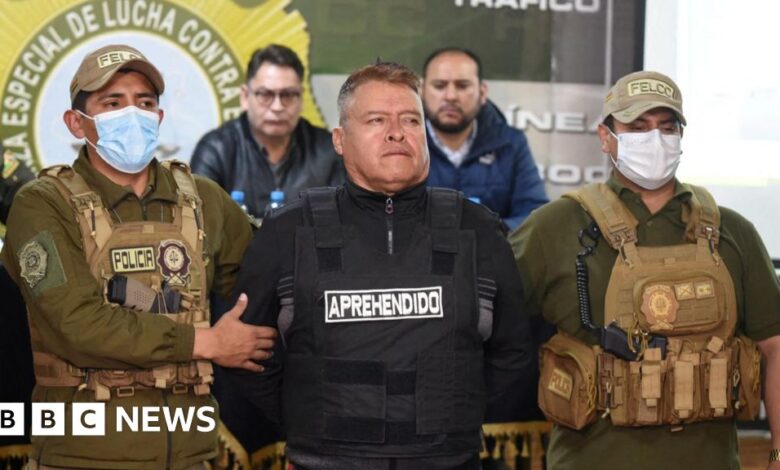Bolivian police arrest coup plotter

Bolivian police have arrested the leader of a coup plot, hours after the presidential palace in La Paz was stormed by soldiers.
Hundreds of soldiers and armored vehicles took up positions on Murillo Square, where important government buildings are located. An armored vehicle tried to smash the entrance to the presidential palace. The soldiers later withdrew from the South American city.
The military leader in charge, General Juan José Zúñiga, has said that he wants to “restructure democracy” and that although he respects “current” President Luis Arce, there will be a change of government .
He was later arrested, seconds after telling reporters that the military had intervened at the president’s request.
General Zúñiga, who was first appointed commander of the Bolivian Army in 2022, was removed from his post on Tuesday, after he made inflammatory comments about the country’s former president, Evo Morales, in an interview the previous day.
In dramatic footage apparently filmed inside the presidential palace as the coup took place, President Arce can be seen confronting General Zúñiga, ordering him to retreat and demanding that he relinquish his role as General Zúñiga. me.
Loud explosions could be heard in the background as the two men – surrounded by aides, journalists and armored police officers – spoke face to face.
Previously, the leftist leader condemned the coup attempt, calling on the public to “organize and mobilize… in support of democracy”.
“We cannot allow again coup attempts to take the lives of the Bolivian people,” he said in a televised message to the country from inside the presidential palace.
His words clearly resonated as pro-democracy protesters took to the streets in support of the government.
He also announced that he was appointing new military commanders, confirming reports that General Zúñiga had been dismissed after publicly criticizing Mr. Morales.
Mr. Morales, who also condemned the coup attempt, called for the criminal prosecution of General Zúñiga and his “accomplices.”
The prosecutor’s office opened a criminal investigation and the head of the Bolivian Navy, Vice Admiral Juan Arnez Salvador, was also arrested.
General Zúñiga’s exact motive for launching the coup remains unclear.
On Monday, he vowed to arrest Mr. Morales if he ran for re-election next year, despite the former president being barred from doing so.
Mr. Morales was forced out of office in 2019 by military generals who said he was trying to manipulate the results of the presidential election, causing him to go into exile in Mexico.
Speaking from Plaza Murillo after the army’s takeover, General Zúñiga accused an “elite” of taking over “the country, saboteurs who destroyed the country.”
But shortly before his arrest, the general told reporters that the president had instructed him to get out of his “blindados” (armored vehicles), in an attempt to improve his waning popularity. He was put into a waiting police car seconds later.
Andrea Barrientos – a leading opposition senator – agreed with his statement, saying that an economic and judicial crisis had prompted Mr. Arce to stage a “self-coup”.
Bolivia is currently under significant pressure on living costs as it struggles to deal with a shortage of US dollars.
“I will say that the government has a lot of questions to answer for the Bolivian people, and they need to explain this situation very clearly,” Ms. Barrientos added. “We would say we need an in-depth investigation into this situation.”
However, it is increasingly clear that Wednesday’s move was a brief and misjudged military uprising rather than any broader separation of powers.
Certainly, the government now appears more vulnerable and others may try to overthrow Mr. Arce’s government – although through politics rather than through the military.
As the army occupied La Paz, Mr. Morales called on his supporters, especially the country’s indigenous coca growing movement, to take to the streets to demand an end to the coup attempt.
That display of people power may have helped strengthen resolve to resist General Zuñiga’s plans, which also included the release of “political prisoners” including former leader Jeanine Áñez.
Both Mr. Arce and his predecessor belong to the same political party, despite internal political conflicts. Their rivalry has made some Bolivians, including General Zúñiga, worry that Mr. Morales could seek another term.
Concerns arose after he tried to circumvent the constitution and seek a fourth term in 2019. Mr. Morales continued to win votes, but he was forced to resign and flee the country after protests violence.
Center-right Jeanine Áñez was the country’s interim leader in 2019-20, but was sentenced to 10 years in prison for what prosecutors said was a coup aimed at overthrowing her predecessor. Ms., Mr. Morales. Incumbent President, Mr. Arce, continued to win re-election in 2020.
Formerly allies, Mr. Arce and Mr. Morales have recently diverged, but they are united in condemning the use of the military to force political change in Bolivia.
Before Mr. Morales came to power in 2005, Bolivia was one of the most politically unstable countries in the Americas. His time in power brought much-needed stability to the Andean nation, at least until it ended ignominiously.
For his part, Mr Arce – who was elected after a period of unrest following the 2019 election – will be heartened by the speed of the region’s response.
Close allies such as the leftist governments in Venezuela and Colombia were quick to condemn what was happening and called for democracy to prevail. Washington also called for calm.
In Paraguay, center-right President Santiago Peña also condemned the coup attempt.
Even Bolivians who oppose his socialist rule will not want to see a return to the dark ages in South America, where the military with a poor human rights record often expelled the country’s democratically elected leader at the barrel of a gun.
But Jhanisse Vaca Daza – a human rights activist – said she was concerned Mr Arce could use the apparent coup as a reason to crack down on his opponents.
“It would legitimize and give (President) Arce’s government more power to arrest new members of the opposition who they believe could be a threat to the opposition,” she said. their government”.
“The fear for many who are currently members of the Legislative Council is that this could also lead to the closure of the Legislative Council or the arrest of members who may be suspected of collaborating with the military.”
Political analyst Carlos Toranzo told BBC Mundo it was “unclear” whether what happened on Wednesday was an attempted coup or “unfortunately a show staged by the government”.
“It was strange,” Mr. Toranzo said, recalling the chain of events that led to the military presence in Murillo Square, adding that “the president and his cabinet were completely quiet.”
“In every coup, communications with the palace are cut off,” the analyst explained, but in this case, the military kept communication channels at the palace intact and official radio stations did not affected.
When asked if there was anything to be gained by arranging an attempted coup, Mr. Toranzo replied: “[President] Arce is winning. The whole country protects democracy.”




